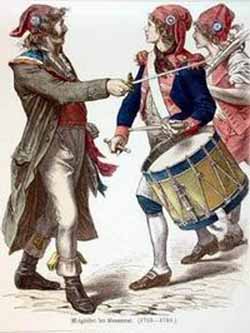My son and I went into D.C. yesterday. I can tell you that the brand new Capitol Visitors’ Center makes touring the Capitol much easier. No longer do you need to go through your Congressman or Senator for a good tour, or stand outside by daybreak to get a ticket for a tour much later in the day. You can reserve a time online, or, especially in the off season, just walk up and get a ticket. We also visited what has to be one of my favorite buildings, the Library of Congress. Its beauty inside is breathtaking. One highlight was seeing the Gutenberg Bible. There are only three complete, perfect copies in existence. This is basically the first major printed book. A dealer who bought it from a German monastery offered to sell it to the United States Congress in 1930 for $2 million. In those cash-strapped times, Congress voted to spend the money. Now it is priceless.
But what I learned from both tours, with our guides talking about the art that was everywhere in both buildings, was the symbolism of the Liberty Cap. This is the conical cloth hat, usually red, with the peak pointing forward or to the side. It appears everywhere in early American iconography.
It comes from classical antiquity and was known as the “Phrygian cap,” being commonly worn in that country of Asia Minor. The Greeks considered Troy part of Phrygia, so early illustrations of Homer used it to identify Trojans.

But then it was used in Rome as a formal marker worn by former slaves to signify that they were now free. Classicist James Yates describes the custom:
Among the Romans the cap of felt was the emblem of liberty. When a slave obtained his freedom he had his head shaved, and wore instead of his hair an undyed pileus (πίλεον λευκόν, Diod. Sic. Exc. Leg. 31º p625, ed. Wess.; Plaut. Amphit. I.1.306; Persius, V.82). Hence the phrase servos ad pileum vocare is a summons to liberty, by which slaves were frequently called upon to take up arms with a promise of liberty (Liv. XXIV.32).
The Phrygian cap thus became associated with freedom and became known as the “Liberty Cap.” American revolutionaries wore it, as did the most radical French revolutionaries.

It adorned the head of many allegorical representations of Lady Liberty, both in the French and the American versions:

In the United States, it is upon many of our older coins and national symbols, such as the Seal of the United States Senate:

The personified statue of “Freedom” that is at the top of the Capitol building originally wore a Liberty Cap. But Jefferson Davis, then Secretary of War who had been put in charge of overseeing the construction of the Capitol, objected. We are born free, he insisted. We have never been slaves. Mr. Davis, who would soon defend the institution of slavery as the president of the Confederate States of America, was repelled by the very idea of being a slave himself. So he rejected the Liberty Cap. The headdress was changed (as you can see in the first article linked above).
Still, I am wondering about the difference between being “born free” and having been freed. It seems that liberty would mean something more to someone who knew bondage and then experienced liberation. In Christian terms, we are not born free; rather, we are born into the slavery of sin. In Christ, though, the Son has freed us and we are free indeed.
We can wear the Liberty Cap, and maybe we should. (Note: I repudiate any Jacobin or Masonic associations that this headgear may carry in proposing to give it instead a Christian meaning.) Politically, it would be an appropriate fashion statement, along with the appropriation of other early revolutionary symbols such as the “don’t tread on me” snake, when attending a Tea Party.














